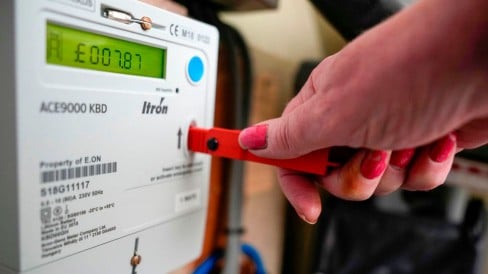
Warrants have been granted to allow the forcible fitting of prepayment meters for the first time in months following a scandal over the practice.
A district judge has given Scottish Power permission to enter homes to fit meters after bills were unpaid.
But nothing will happen until approval has been given by energy regulator Ofgem. No supplier has yet satisfied all the criteria required.
Fitting was halted after agents broke into the homes of vulnerable people.
An investigation by The Times, exposing the actions of agents for British Gas, led to a public outcry.
The courts service also came under criticism for waving through batches of applications from suppliers.
Since February, no forced fittings of meters have taken place, and the regulator has drawn up a code of conduct that sets out what suppliers are required to do.
Delay before fittings resume
Some 124 applications were made by Scottish Power at Berkshire Magistrates Court, sitting in Reading, on Thursday.
The court heard details of a selection of cases in which customers had not paid energy bills, often having built up to more than £2,000 for gas and the same for electricity.
Representatives, speaking on behalf of Scottish Power, explained how numerous attempts were made to contact these customers by letter, email, text and by visiting the property.
District Judge Samuel Goozee granted all of the applications for a warrant to install meters.
However, in each case, Scottish Power vowed not to fit a meter if there was evidence when they entered the home that there was a high vulnerability risk in the household.
In each case, £30 would be credited to the prepayment meter when it was fitted.
- Firms told to stop force-fitting prepayment meters
- What is the energy cap and what's happening to bills?
No fittings can take place until approval has been given by the regulator in line with a certain set of conditions.
An Ofgem spokesman told the BBC: "Ofgem put a set of clear conditions in place, which suppliers must meet before they can restart the involuntary installation of prepayment meters. To date, no supplier has met those conditions and until they do no warrants to install a meter should be executed.
"We are aware that courts are running pilot schemes to test the application process for warrants. However, our expectation of suppliers is clear."
Under the conditions:
- Suppliers must have an independent assessment to verify that they can keep to the rules
- Companies must check for wrongfully installed meters and, if found, offer compensation and return the household to a standard meter
- Companies' boards must be satisfied the conditions have been met
- Regular monitoring data must be supplied to Ofgem
Separately, suppliers must prove to courts hearing warrant applications that they can keep to a code of conduct, set by Ofgem, which becomes mandatory on 8 November, and states that suppliers must have to make at least 10 attempts to contact a customer and conduct a "site welfare visit".
Meters should not be fitted:
- when customers are over 75, unless someone younger also lives in the home
- in households with children under the age of two
- if anyone lives there with a terminal illness or certain conditions which would get worse in a cold home
The lead fitter would also have to wear body cameras or audio equipment.
Campaigners want a total ban on the force-fitting of prepayment meters. Such a ban would need to be introduced by government ministers.
"It is totally inappropriate for energy firms to be seeking to forced their way into people's homes to force them onto dangerous prepayment meters that leaves them at risk of disconnection and going without energy," said Simon Francis, co-ordinator of the End Fuel Poverty Coalition.
What can I do if I can't afford my energy bill?
- Check your direct debit: Your monthly payment is based on your estimated energy use for the year. Your supplier can reduce your bill if your actual use is less than the estimation.
- Pay what you can: If you can't meet your direct debit or quarterly payments, ask your supplier for an "able to pay plan" based on what you can afford.
- Claim what you are entitled to: Check you are claiming all the benefits you can. The independent MoneyHelper website has a useful guide.


